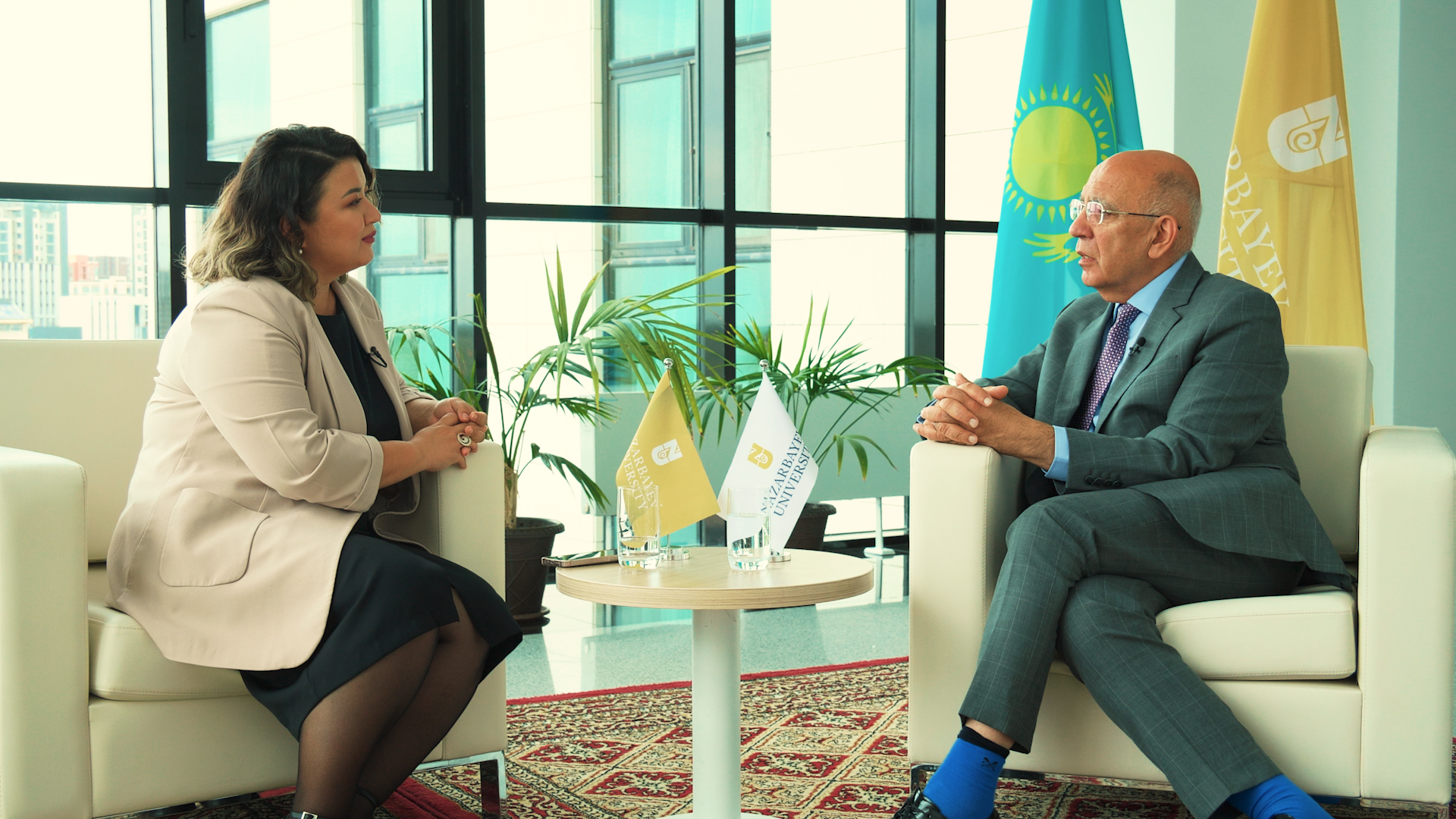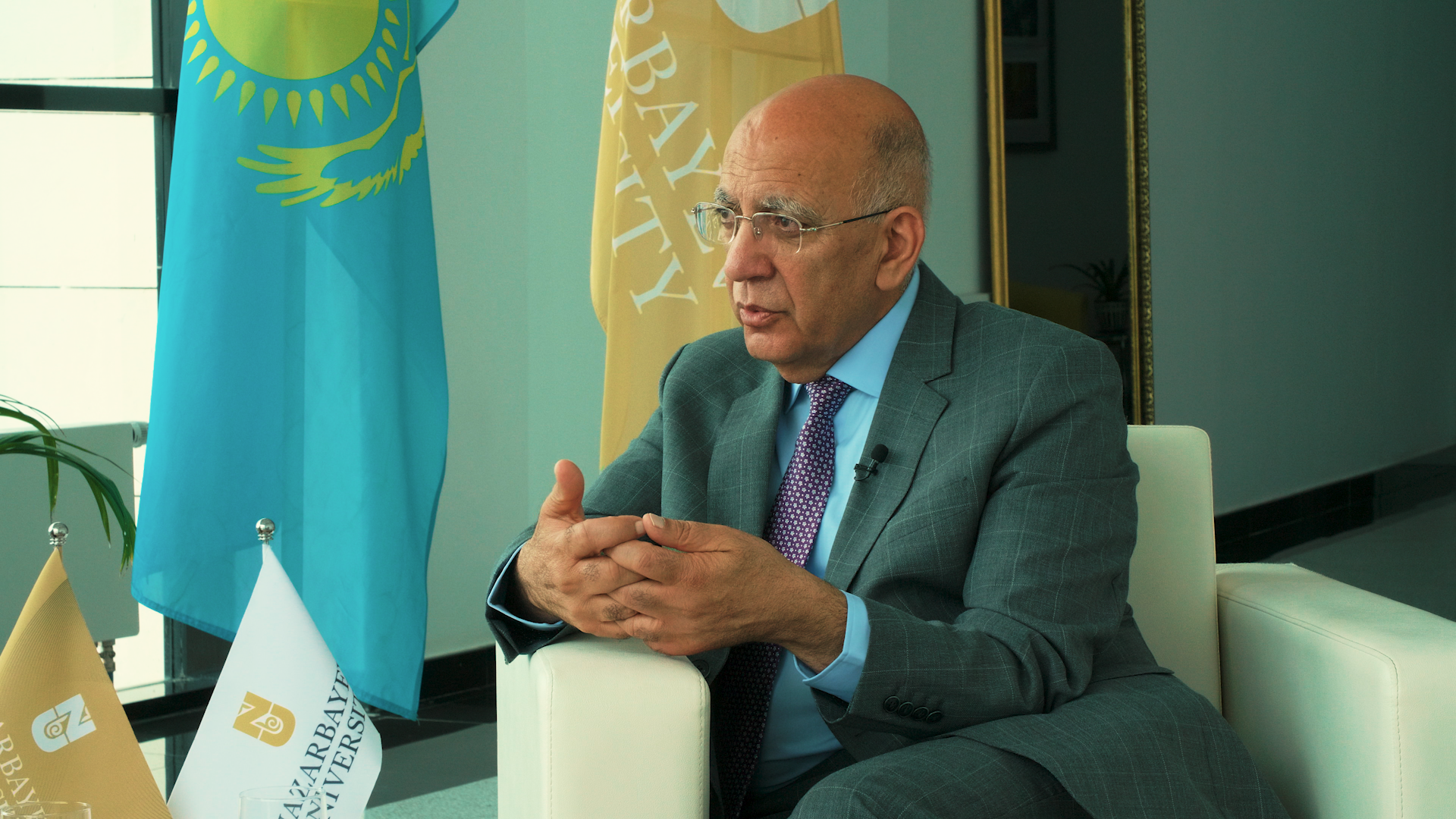ASTANA — According to Dr. Waqar Ahmad, the newly appointed president of Nazarbayev University (NU), the university is a pivotal force in Kazakhstan’s development. This is largely due to the foresight of the country’s leadership, which recognized early on that investment in education is key to national advancement and global presence.

In an interview with The Astana Times YouTube channel, Dr. Ahmad emphasized that NU enjoys a privileged position, but it also recognizes the privilege comes with significant responsibility. Photo credit: The Astana Times.
Dr. Waqar, a British national with a PhD from the University of Bradford, has had a distinguished academic career. He advanced from professor roles at the University of York and University College London to Deputy Vice-Chancellor at Middlesex University. Between 2001 and 2004, he served as Chief Social Scientist at the Office of the Deputy Prime Minister in the UK. Since 2017, he has been the Chancellor of Abu Dhabi University, where his leadership helped the institution achieve a ranking of 250-300 in the Times Higher Education World University Rankings 2023. He is also the author of over 90 research papers in prestigious scientific journals.
In an interview with The Astana Times YouTube channel, Dr. Ahmad emphasized that NU enjoys a privileged position in terms of financing and support, but he acknowledged that the entire NU staff recognizes that this privilege comes with significant responsibility.
NU’s role in transforming education and healthcare in Kazakhstan
“It’s not just about creating a model of higher education relevant to local and regional needs, but also about being a catalyst for reforming healthcare and setting a standard for an internationally competitive university recognized for the quality of its teaching and the contribution of its research,” he said.

Dr. Ahmad was appointed as NU’s new president this June. Photo credit: The Astana Times.
He highlighted the NU’s role in turning research into innovations that drive public policy and other improvements.
“Without the resources we have, NU would not have achieved what it has,” he said, underscoring the university’s obligation to leverage its strong foundation to establish itself as a world-class institution.
Dr. Ahmad explained that NU operates under five mandates, three of which are focused on research that can be transformed into innovation.
“Universities are about the creation and application of knowledge. We create knowledge through great research and apply it through teaching and turning research into practical solutions,” he noted.
The other two mandates, he added, are to act as a catalyst for higher education reform and to provide a model for integrated healthcare comparable to global standards.
NU’s approach to academic excellence
Emphasizing the university’s commitment to pedagogy, Dr. Ahmad described NU’s approach to teaching as one where students are active learners.
“They don’t come here as empty vessels to be filled with knowledge. They come here to support their own development through active participation,” he said, citing problem-based learning, research projects, and group work as key components of this method.
On the subject of research, Dr. Ahmad praised NU’s infrastructure, noting that the university is equipped with cutting-edge labs dedicated to research.
“Our doctoral students, professors, and even undergraduates are engaged in groundbreaking work,” he said, adding that some projects are externally funded, while others are supported internally to drive reforms through collaboration with other universities.
“By lifting their standards, we build capacity and demonstrate what great research looks like,” he added.
Dr. Ahmad pointed out that about 50% of NU’s publications are in top-tier journals, aligning closely with international standards.
“The global average for a field-weighted citation is one. That is the global average. At NU, the field-weighted citation impact is 1.74, which means our research impact is 74% better than the global average,” he stated, noting a desire to achieve even higher standards.
According to Dr. Ahmad, NU also serves as a model of excellence in governance, academic freedom, and leadership. He highlighted that NU has successfully extended its impact on higher education across Kazakhstan through the achievements of its Graduate School of Education. The school has trained thousands of alumni, many of whom hold leadership positions in higher education across Kazakhstan. “Some have become vice-rectors and directors of other universities,” he said.
Reflections on Kazakhstan’s aspirations to become a Central Asian educational hub
Reflecting on Kazakhstan’s aspirations to become an educational hub in Central Asia, Dr. Ahmad acknowledged the progress made and the challenges ahead. He cited examples of successful educational hubs like the United Arab Emirates and the United Kingdom, noting that while Kazakhstan can learn from these models, success is not guaranteed.
“For instance, Qatar made significant investments in its education sector, but the initiative has not been as successful. Some of the universities that were initially set up in Qatar are now returning home, with even some elite U.S. universities deciding to withdraw from the region,” he said.
According to Dr. Ahmad, Kazakhstan can learn from these experiences. The key is to create a sustainable and long-lasting educational system that will attract international students.
“We have great partners and are recognized as a quality institution, but we need to make a greater impact in attracting international students. Our research has now reached an ambitious stage. The quality of our pedagogy and programs is internationally recognized, and with these accreditations, we stand at the forefront of excellence. However, until now, we have not made as significant an impact in attracting international students as I would like. Although I have only been here for two months, I have already established a dedicated team to address this challenge specifically,” he said.
Dr. Ahmad stressed the importance of creating a welcoming and inclusive environment for international students.
“Students coming from abroad seek a sense of safety and belonging. They want to attend a multicultural university, where they feel respected and where their diversity is respected,” he said.
Dr. Ahmad also addressed the broader implications of attracting international students. He noted that while countries like the UK have faltered in this regard, others like Australia and the UAE have successfully capitalized on the global demand for higher education.
“Smart countries recognize that attracting talent through higher education is in their national interest. It supports the economy and public services and contributes to a more vibrant society,” he concluded.
